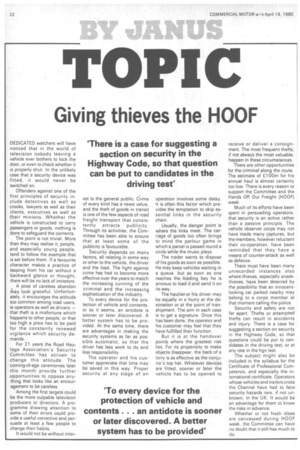TOP I C
Page 24

If you've noticed an error in this article please click here to report it so we can fix it.
Giving thieves the HOOF
'There is a case for suggesting a section on security in the Highway Code, so that question can be put to candidates in the driving test'
DEDICATED watchers will have noticed that in the world of television nobody leaving a vehicle ever bothers to lock the door, or even to check whether it is properly shut. In the unlikely case that a security device was fitted, it would never be switched on.
Offenders against one of the first principles of security in clude detectives as well as crooks, lawyers as well as their clients, executives as well as their minions. Whether the vehicle is constructed to carry passengers or goods, nothing is done to safeguard the contents.
The point is not trivial. More than they may realise it, people, and especially young people, tend to follow the example that is set before them. If a favourite character makes a practice of leaping from his car without a backward glance or thought, there will be no lack of imitators.
A pose of careless abandon may look graceful. Unfortun ately, it encourages the attitude .too common among road users, ie operators as well as drivers — that theft is a misfortune which happens to other people, or that too high a price has to be paid for the constantly renewed vigilance which security demands.
For 21 years the Road Haulage Association's Security Committee has striven to change this attitude. The coming-of-age ceremonies later this month provide further opportunities to oppose anything that looks like an encouragement to be careless.
Among the first targets could be the more culpable television producers or directors. A pro gramme drawing attention to some of their errors could pro vide a useful corrective and persuade at least a few people to change their habits.
It would not be without inter est to the general public. Crime of every kind has a news value, and the theft of goods in transit is one of the few aspects of road freight transport that consistently attracts publicity. Through its activities, the Committee has been able to ensure that at least some of the publicity is favourable.
Securiti-crepends on many factors, all relating in some way or other to the vehicle, the driver and the load. The fight against crime has had to become more effective over the years to match the increasing cunning of the criminal and the increasing sophistication of the industry.
To every device for the protection of vehicle and contents, or so it seems, an antidote is sooner or later discovered. A better system has to be provided. At the same time, there are advantages in making the security systems as far as possible automatic, so that the driver has less work to do and less responsibility.
The operator and his customer appreciate that time may be saved in this way. Proper security at any stage of an operation involves some delay. It is often this factor which provides the temptation to skip essential links in the security chain.
Usually, the ,danger point is where the links meet. The carriage of goods too often brings to mind the parlour game in which a parcel is passed round a circle while the music plays.
The trader wants to dispose of his goods as soon as possible. He may keep vehicles waiting in a queue, but as soon as one reaches the loading bay he is anxious to load it and send it on its way.
The haulieror his driver may be equally in a hurry at the destination or at the point of transhipment. The aim in each case is to get a signature. Once this has been done, the operator and his customer may feel that they have fulfilled their function.
But it is at the handover points where the greatest risk lies. For its propensity to make objects disappear, the back of a lorry is as effective as the conjuror's top hat. Whatever devices are fitted, sooner or later the vehicle has to be opened to receive or deliver a consignment. The most frequent thefts, if not always the most valuable, happen in these circumstances.
There are other opportunities for the criminal along the route. The estimate of E100m for his annual haul is almost certainly too low. There is every reason to support the Committee and the Hands Off Our Freight (HOOF) week.
Much of its efforts have been spent in persuading operators, that security is an active rather than a passive principle. The vehicle observer corps may not have made many captures, but the members, however reluctant their co-operation, have been reminded that they have a means of counter-attack as well as defence.
There must have been many unrecorded instances also where thieves, especially sneakthieves, have been deterred by the possibility that an innocentlooking car parked nearby may belong to a corps member at that moment calling the police.
Security and safety are not far apart. Thefts or attempted thefts can result in accidents and injury. There is a case for suggesting a section on security in the Highway Code, so that questions could be put to candidates in the driving test, or at any rate in the hgv test.
The subject might also be included in the syllabus for the Certificate of Professional Competence, and especially the international certificate. Operators whose vehicles and trailers cross the Channel have had to face security hazards rare, if not unknown, in the UK. It would be an advantage for them to know the risks in advance.
Whether or not fresh ideas are canvassed during HOOF week, the Committee can have no doubt that it still has much to do.












































































































